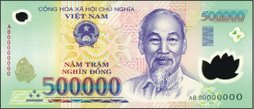This morning's Financial Times had an interesting article comparing the responses of the major Asian economies to the financial crisis. It noted:
"Fortunately, Vietnamese exports have been fairly resilient. While economies such as Singapore and Taiwan have seen declines of 30 or 40 per cent in shipments, Vietnam was down a modest 3.7 per cent in the first four months of this year against the same period in 2008. Economists think Vietnam might be benefiting from a new Wal-Mart effect by which western consumers switch from expensive branded products to cheaper goods in which countries such as Vietnam excel. Last month, the port at Ho Chi Minh City was so busy it was backed up with ships. “They’re not producing i-Pods and laptops; they’re producing T-shirts and shoes,” says Jonathan Pinkus of Harvard University’s Kennedy School of Government."
Wednesday, May 27, 2009
What's up?
Vietnam's real estate market, apparently! Don Lam, an executive at VinaCapital, spoke about Vietnam's economy a few weeks ago on CNBC in terms much clearer than you'll find anywhere else online. His comments made me wonder how Vietnam's domestic entrepreneurial class will respond to the infusion of liquidity ushered through the stimulus package. The Vietnam Chamber of Commerce and Industry (VCCI) seems enthusiastic, making me even more interested in the upcoming Vietnam Business Forum.
Monday, May 25, 2009
Business (as usual)
Next week, the Vietnamese government will welcome hundreds of American, European, and Asian investors to Hanoi for the first of two semi-annual discussions of the state of the Vietnamese economy. Discussions between companies and the government take place all the time, usually through organizations like the American Chamber of Commerce, but next week's meeting carries uncommon importance. In addition to being sponsored by the World Bank and the IMF, the Vietnam Business Forum (as it's called) opens Hanoi's most venerated policy arenas to international scrutiny, inviting opinions from companies headquartered all over the world. It also receives more western media coverage than any other event in Vietnam.
The transcripts from VBF meetings going back to their inception are uniformly uninteresting -- unless you enjoy hearing people praise autocratic technocracy in many different languages (including Hindi). When your economy's growing at 8 percent, nary an international businessman would dare complain about something so esoteric and surmountable as inadequate technical training. But, as a noted Vietnam economist told me a few weeks ago, this year, Vietnam's economy might not grow at all. Even though the financial crisis has affected Asia less than other regions, Vietnan's economy, which survives on exports and outside investment, has been weakened by external financial turmoil. The time for niceties and applause has finally passed.
Anybody who watches C-SPAN even occasionally probably yearns, at least sardonically, for authoritarian governance. I mean, come on -- I know I'm not the only one who's wondered why we allow elected officials whose backgrounds in finance are as limited as yours or mine to design financial regulation (with able-minded economists sitting ruefully on the sidelines). But it's a sacrifice we make for living in a democracy. In Vietnam, no such sacrifice exists -- the people accept an authoritarian government, and in exchange, they suffer no such rhetorical agony (only outright exclusion -- which doesn't seem like such a bad tradeoff anymore). Policy is made only after it's been formulated by economists, reviewed by investors, redrafted by policy analysts, and approved by policymakers. The Vietnam Business Forum establishes the guiding theme for those proceedings.
My guess is that this year's first forum will concentrate on infrastructure and technical training. The first coincides with the government's widely hailed efforts to push small enterprises into multinational corporations' supply chains. The second responds to the growing demand among high value-added companies for skilled workers. We shall see.
And the New York Times had this interesting article.
G'night!
The transcripts from VBF meetings going back to their inception are uniformly uninteresting -- unless you enjoy hearing people praise autocratic technocracy in many different languages (including Hindi). When your economy's growing at 8 percent, nary an international businessman would dare complain about something so esoteric and surmountable as inadequate technical training. But, as a noted Vietnam economist told me a few weeks ago, this year, Vietnam's economy might not grow at all. Even though the financial crisis has affected Asia less than other regions, Vietnan's economy, which survives on exports and outside investment, has been weakened by external financial turmoil. The time for niceties and applause has finally passed.
Anybody who watches C-SPAN even occasionally probably yearns, at least sardonically, for authoritarian governance. I mean, come on -- I know I'm not the only one who's wondered why we allow elected officials whose backgrounds in finance are as limited as yours or mine to design financial regulation (with able-minded economists sitting ruefully on the sidelines). But it's a sacrifice we make for living in a democracy. In Vietnam, no such sacrifice exists -- the people accept an authoritarian government, and in exchange, they suffer no such rhetorical agony (only outright exclusion -- which doesn't seem like such a bad tradeoff anymore). Policy is made only after it's been formulated by economists, reviewed by investors, redrafted by policy analysts, and approved by policymakers. The Vietnam Business Forum establishes the guiding theme for those proceedings.
My guess is that this year's first forum will concentrate on infrastructure and technical training. The first coincides with the government's widely hailed efforts to push small enterprises into multinational corporations' supply chains. The second responds to the growing demand among high value-added companies for skilled workers. We shall see.
And the New York Times had this interesting article.
G'night!
Beginning
Friends, family, and fans... I have returned to the blogosphere.
I'm preparing to spend the next 10 months doing Fulbright research in Vietnam, moving between Hanoi and Saigon in search of answers to the transcendental questions I established two years ago. Yes, I know it's been two years, and no, my questions (why are companies flooding the Vietnamese economy with investment? will foreign direct investment foster political change in Vietnam?) aren't that difficult. But hey, the Fulbright people thought enough of them to sponsor me, so I'm packing my bags and digging even deeper. I hope you'll come along for the ride.
My research project will examine how foreign investors -- notoriously attentive to sociopolitical nuance and traditionally averse to the sort of uncertainty inherent in authoritarian societies -- influence Vietnamese economic policy through their dealings with the Communist government. I'll be spending the first part of my fellowship at Vietnam National University in Hanoi and the second in downtown Saigon (location TBD -- tips and offers appreciated!)
A lot's happened since I last updated my blog. I've written a thesis, which I'll soon make available online, about the relationship between American companies and the Vietnamese government. I've (sort of) learned Vietnamese through instruction at the University of Florida, and I've completed an internship in the Center for Northeast Asian Policy Studies at the Brookings Institution (fantasy land for nerds... like me). My family now resides in West Bloomfield, Michigan where my father owns and operates a meatpacking plant. My sister, Jamie, just finished her freshman year at Indiana University, and I've deferred my admission to the Master's Program at the Fletcher School of Law & Diplomacy at Tufts University.
Alright, now that that's settled...
Next time.
I miss you, em!
I'm preparing to spend the next 10 months doing Fulbright research in Vietnam, moving between Hanoi and Saigon in search of answers to the transcendental questions I established two years ago. Yes, I know it's been two years, and no, my questions (why are companies flooding the Vietnamese economy with investment? will foreign direct investment foster political change in Vietnam?) aren't that difficult. But hey, the Fulbright people thought enough of them to sponsor me, so I'm packing my bags and digging even deeper. I hope you'll come along for the ride.
My research project will examine how foreign investors -- notoriously attentive to sociopolitical nuance and traditionally averse to the sort of uncertainty inherent in authoritarian societies -- influence Vietnamese economic policy through their dealings with the Communist government. I'll be spending the first part of my fellowship at Vietnam National University in Hanoi and the second in downtown Saigon (location TBD -- tips and offers appreciated!)
A lot's happened since I last updated my blog. I've written a thesis, which I'll soon make available online, about the relationship between American companies and the Vietnamese government. I've (sort of) learned Vietnamese through instruction at the University of Florida, and I've completed an internship in the Center for Northeast Asian Policy Studies at the Brookings Institution (fantasy land for nerds... like me). My family now resides in West Bloomfield, Michigan where my father owns and operates a meatpacking plant. My sister, Jamie, just finished her freshman year at Indiana University, and I've deferred my admission to the Master's Program at the Fletcher School of Law & Diplomacy at Tufts University.
Alright, now that that's settled...
Next time.
I miss you, em!
Subscribe to:
Comments (Atom)


